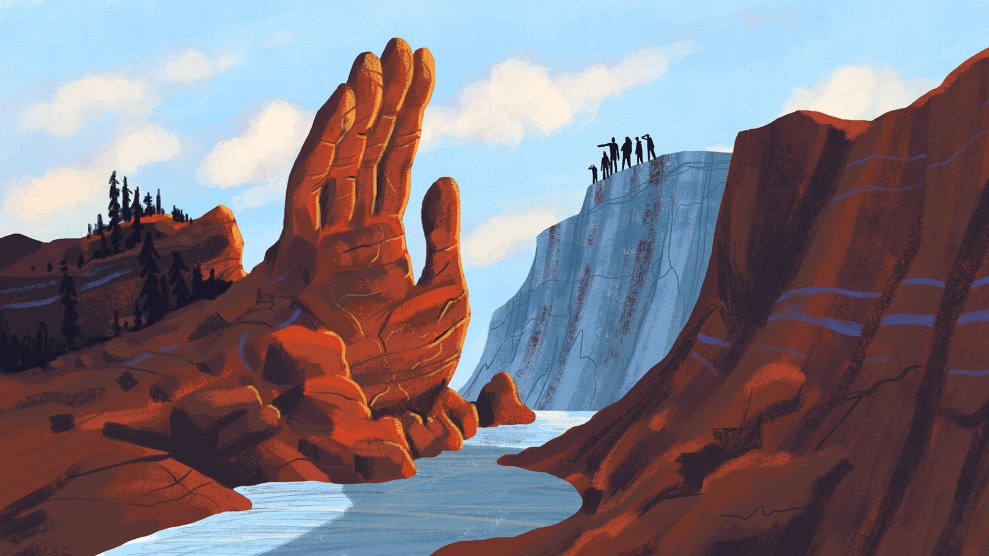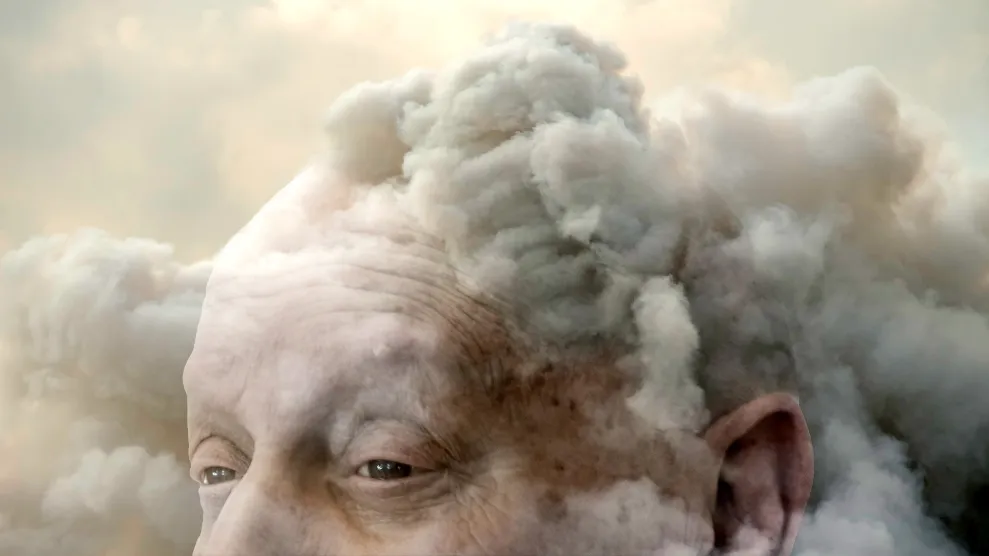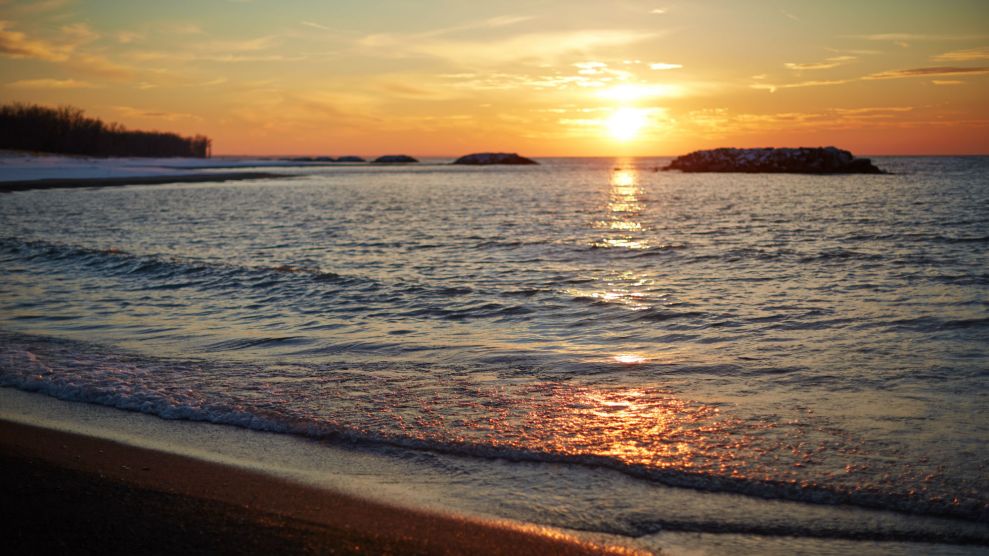
Matt Chinworth
In the summer of 2014, officials in Toledo, Ohio, announced that the city’s tap water was no longer safe to drink. A toxic algae bloom caused by fertilizer runoff had poisoned Lake Erie, the primary water source for the area’s half-million residents, sickening more than 100 people. Stores emptied of bottled water within hours. For three days, “it was just total panic,” recalls Markie Miller. “People were fighting over it.”
Miller joined Toledoans for Safe Water, a group of residents who had been trying to convince officials to clean up the lake, to no avail. Then, in late 2015, members of the group attended a presentation put on by the Community Environmental Legal Defense Fund about advancing the “rights of nature”—the idea that ecosystems, like humans, have legal rights.
After the presentation, some Toledoans met in a pub and drafted the Lake Erie Bill of Rights. This past February, voters chose to amend the city charter to grant the lake the right to “exist, flourish, and naturally evolve.” The amendment allows any resident to sue governments or businesses that infringe upon the lake’s rights—for example, by polluting it with fertilizer.
Toledo isn’t the only place to recognize the rights of nature. In 2006, Tamaqua Borough, Pennsylvania, passed an ordinance to prohibit corporations from dumping waste sludge into nearby open-pit mines by mandating that any resident could sue to vindicate the “rights of natural communities and ecosystems.” Since then, more than three dozen communities across the United States have adopted similar measures. In 2018, the White Earth Band of Ojibwe, a Native American nation in Minnesota, codified the rights of manoomin, or wild rice, to “flourish, regenerate, and evolve.” As Casey Camp-Horinek, an environmentalist and matriarch of the Ponca Nation in Oklahoma, points out, the rights-of-nature movement “simply recognizes what the indigenous people have always been a part of: the natural cycle of life belonging to all living things, not just humans.”
Outside the United States, Ecuador wrote the rights of nature into its constitution in 2008. In 2017, a court in India ruled that the Ganges and Yamuna rivers have the same legal standing as people (the ruling was later overturned). The Whanganui, New Zealand’s longest navigable river, has legal standing under a law passed that same year.
Rights-of-nature laws often work by appointing a guardian to advocate for a particular ecosystem or natural feature, much like a parent represents a child’s interests in court. The guardian can sue on the ecosystem’s behalf. If the ecosystem is awarded damages, the money might go into a trust dedicated to funding its restoration.
Predictably, conservatives have ridiculed the idea of entitling lakes and forests. In 2011, Fox News editor George Russell wrote that the movement aims to create a “radical regime of global environmental law.” Wesley Smith, a senior fellow at the right-wing Discovery Institute, warned in a 2011 editorial that granting rights to nature would “open the courtroom doors to radical environmentalist lawyers” who’d “fire a continual barrage of lawsuits seeking to uphold the rights of their animal and vegetable clients.” (In practice, rights-of-nature laws apply to entire ecosystems rather than a single mushroom or tree.)
“Each time there is a movement to confer rights onto some new ‘entity,’ the proposal is bound to sound odd or frightening or laughable,” noted Christopher Stone in his seminal 1972 essay, “Should Trees Have Standing?” Stone, a University of Southern California law professor, was one of the first Western legal scholars to contemplate nature’s ability to take part in lawsuits.
But just look at the American legal system: Corporations and even ships have rights. “We’re human beings. We make laws,” says David Boyd, an associate law professor at the University of British Columbia and author of the 2017 book The Rights of Nature. “We have the capacity to recognize the rights of whomever and whatever we want. It’s just a matter of determining what’s important to us.”
At the very least, says Andrew Wetzler, managing director of the Natural Resources Defense Council’s Nature Program, the rights-of-nature movement could inspire people to consider their surroundings in a new light. “Once you start seeing something as being deserving of moral consideration, you start to view the whole natural world differently, and you start to see that nature isn’t simply created for people to use,” he says, “and that’s a fundamental shift in perspective.”
But is the United States ready for such an overhaul of environmental laws? A day after the Toledo amendment passed, a farmer sued the city, alleging the lake’s bill of rights is unconstitutional and exposes his farm to “massive liability.” In May, the judge overseeing the case rejected Toledoans for Safe Water’s motion to intervene in the suit on behalf of the lake: “Some may believe the law should confer legal standing upon natural objects and features,” he wrote, “but a district court—bound by Congress and higher courts—is not the appropriate body to take that leap.”
A spokesperson for Toledoans for Safe Water says the group plans to appeal the decision. As many residents remember, the fight for a clean Lake Erie was decades in the making. In the late ’60s, the water became so polluted by chemical waste and dead fish, the media declared the lake had been “killed.” The crisis helped spark passage of the Clean Water Act. Toledo’s Markie Miller thinks the battle over its bill of rights will serve as a starting point for a new kind of movement: “The people of Toledo won’t be going away anytime soon,” she says. “Lake Erie needs our protection.”
Correction: This story has been updated to include the correct job title for Andrew Wetzler.
















